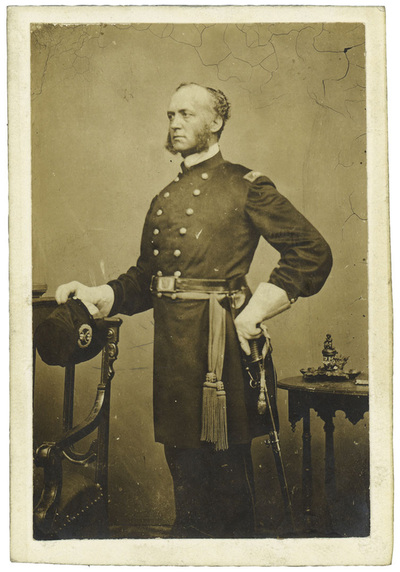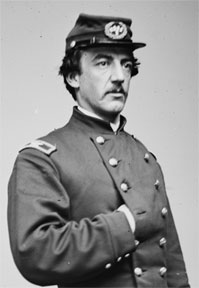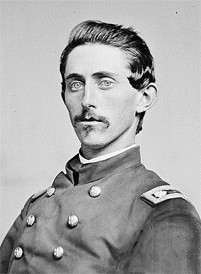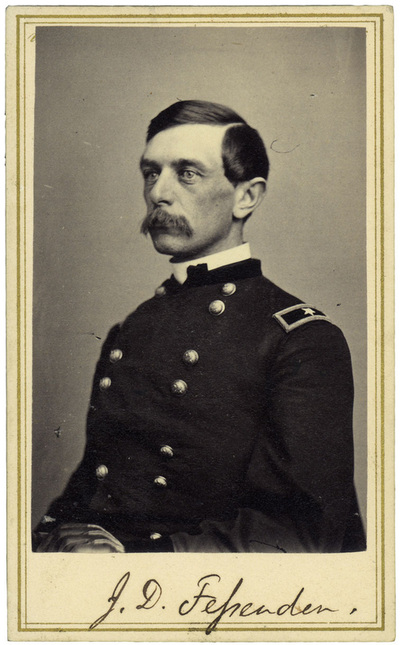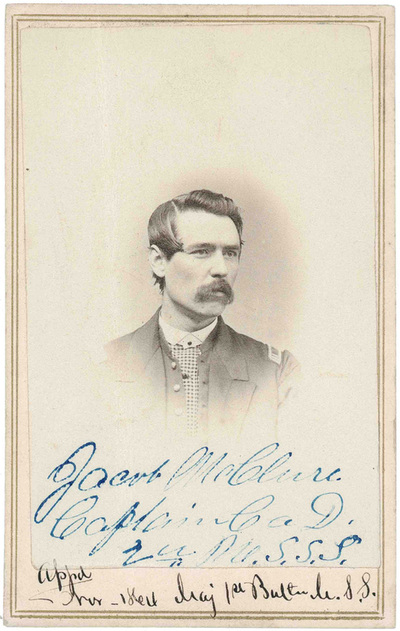|
"During its term of service company D had on its rolls 156 men and officers. Of these 16 were killed in action or died of wounds; 16 died of disease; 5 were missing in action; 8 deserted; 3 were transferred to the Veteran Reserve corps and 2 to the navy; 46 were discharged for disability and 11 at expiration of term of service; 22 had re-enlisted, of whom 4 had been killed or died of their wounds, and the remainder of them and of the recruits, numbers in all 49, present and absent, were transferred to the Seventeenth Maine regiment..." "When the Seventeenth was mustered out June 4t, 1865, the men of company D were again transferred, this time to the First Maine Heavy Artillery regiment, and with it were mustered out of service September 11, 1865." --Maine at Gettysburg
Founder: Colonel Hiram Berdan 1st Commander: Colonel Henry A.V. Post 2nd Commander: Homer R. Stoughton
James Deering Fessenden: Fessenden, James D., brigadier-general, was born in Westbrook, Me., Sept. 28, 1833, was graduated at Bowdoin in 1852, and then practiced law in Portland until the Civil war broke out. He was commissioned captain of the 2nd U. S. sharpshooters, Nov. 2, 1861, and in 1862-63 served on the staff of Gen. David Hunter and engaged in the operations on the Carolina coast, being present at the attack on Fort McAllister, in the operations on the Edisto, and at Du Pont's attack on Charleston. He organized and commanded the 1st regiment of colored troops in May, 1862, but the government refused to accept such service at that time. In July of that year he was promoted colonel and additional aide-de-camp. He was subsequently transferred to the Army of the Tennessee, in 1863, and served under Hooker in the campaigns of Chattanooga in that year and Atlanta in 1864. He was promoted brigadier-general of volunteers, Aug. 8, 1864, was ordered to report to Gen. Sheridan in the valley of Virginia, and participated in the battle of Cedar creek in October. He was brevetted major-general of volunteers, March 13, 1865, for distinguished service in the war and served in South Carolina until mustered out, Jan. 15, 1866. Returning then to Maine, he was appointed register of bankruptcy in 1868 and was representative in the state legislature, 1872-74. Gen. Fessenden died in Portland, Me., Nov. 18, 1882. Source: The Union Army, vol. 8 Jacob McClure (Rockland, ME), Oct 17, 1862; discharged April 12, 1864; commissioned Major, First Maine Sharpshooters, Sept. 16, 1863, and Lieut-Col. Feb. 2, 1864, but was not mustered on either of these promotions. Stephan C. Barker (Augusta, ME), April 27, 1864; promoted from First Sergeant; discharged for disability on account of wounds Nov. 30, 1864. Edgar Crockett, Dec. 15, 1864; originally Private, promoted to Corporal and Sergeant, to First Lieutenant May 1, 1864, and to Captain; discharged 1865, rendered supernumerary by consolidation. Silas Barker, Oct. 17, 1862; promoted from Second Lieutenant; resigned May 28, 1863. Daniel L. Cummings, Sept. 1, 1863; originally Corporal, promoted to Sergeant and First Sergeant, to Second Lieutenant Oct. 17, 1862, and to First Lieutenant; discharged for disability Mar. 1864. James Mero Matthews, commissioned Dec. 15, 1864; originally Private, promoted to Sergeant and First Sergeant, to Second Lieutenant, mustered Dec. 5, 1864, and to First Lieutenant; appointed acting Adjutant of regiment Dec. 23, 1864; rendered supernumerary by transfer of Company D to Seventeenth Maine regiment Feb. 18 and discharged Feb. 23, 1865. Company D Action (Source Maine Archives)
|
|
The real men of Company D
As living historians, it is important to not only portray a time period but also to study, appreciate, and portray the individuals and events that shaped Co. D.
